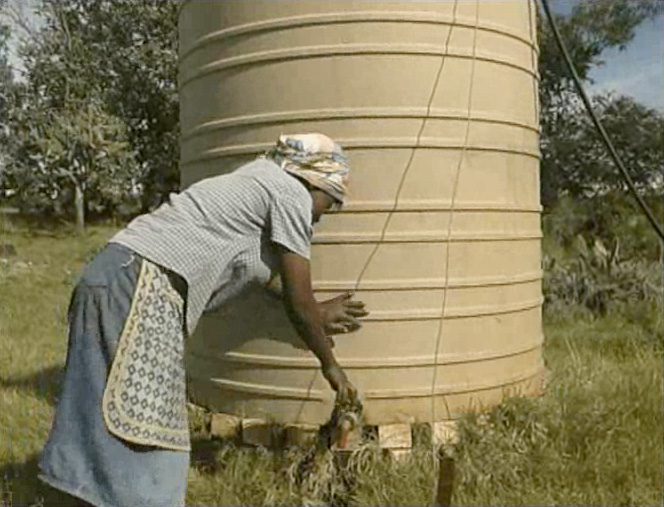By Hayley Mueller, Xoli Matomela and Joe Edmeades
GRAHAMSTOWN, South Africa - Nomsimelelo Mekane wakes up every morning wondering where the water supply for the day will come from. Bathing, cooking, drinking, cleaning and washing have all become luxuries. Usually, she has water only when she can coax people nearby to give her some. Some days, when no one is feeling charitable, she says, she has to resort to stealing.
Ms Mekane and her husband are unemployed and destitute. They had worked most of their lives on a tomato farm about 30 miles east of this little university town in the rolling, sunburned hills of the Eastern Cape Province, the second largest province in South Africa - about the size of Uruguay. The tomato farm was converted into a private wild life park catering to foreign tourists and the Mekanes were forced off the land.
The Mekane’s situation is not unique. Siphokasi Jika of the Grahamstown Legal Aid Clinic said many farm workers have been evicted as profits for cattle and vegetable farmers in the Eastern Cape have declined and the farmers have increasingly sold their land to developers of game or safari parks where lions and leopards roam with elephants, rhinos and buffalo,.
As the farms have shut down, the unemployment rate in the Eastern Cape has soared to 48%. Many farm hands survive by working tiny plots that produce just enough to feed themselves and their families.
The Mekanes, who have a three-month-old daughter, say they were promised land to live on and a steady supply of water as compensation. But they say years went by before they were able to get the game reserve to provide a water tank that would give them a regular supply of water. They got the tank, they say, only with the help of a group of advocates for farm workers. Then, they say, just months after the tank was installed, it went dry. As a result, Ms. Mekane often spends hours each day scavenging for water.
“I’m in such despair,” Ms Mekane said in an interview, “The way we struggle here; it’s not the same as before; before it was okay.”
Ms Mekane said she complained to officials at the Lalibela Game Reserve that now operates on land where she and many others once picked tomatoes. Mienkies Peters, the manager of the game reserve, said he had not heard that the Mekanes had a water problem. “If the Mekane family had come to me with the problem, I would have fixed it immediately,” he said.
Rick Van Zyl, the chief executive of the 18, 500-acre game park, said his five star resort has conscientiously provided drinking water and housing for the hundreds of people who were forced off the tomato farm.
Mr Van Zyl said the owners of the Lalibela Game Reserve intended that “no one should be worse off than they were before.”
The day her family was moved off the land, Ms. Mekane said, she saw a crew of men dismantling her tin shack as she returned from a trip to Grahamstown. Her shack, and those of neighbors, was then reassembled two miles away from where the Lalibela Game Reserve was going up.
Stunned that her home was being taken apart, Ms Mekane said she hitchhiked back to Grahamstown to seek help from the Eastern Cape Agricultural Research Project, a non-profit organization that represents displaced farm workers in disputes with land owners. Ms. Mekane said while the organization helped her family get the water tank, it has been unable to get other concessions from the game reserve owners.
South African law requires compensation for farm workers with more than 10 years of service and for those who are more than 60 years old at the time of dismissal. The law also provides compensation on a lower scale for other farm workers. All dismissed farm workers are entitled to a place to live and water for drinking and cooking.
The law seems great on paper, Ms. Jika said. But workers, like the Mekanes, often do not know their rights and are driven off with nothing but a few possessions. “Things are starting to change,” for the better, Ms. Jika said. “But there are still hundreds of people being evicted off their land on a yearly basis. In most cases proper procedure is not followed.”

